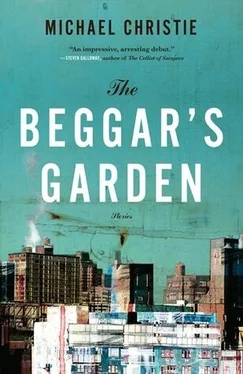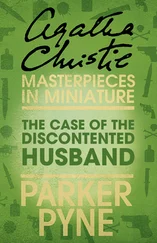Then early one morning I woke up to a noise I thought was rats. I turned the light on and saw Rick going through his boxes of stuff.
Oh. Hi, he said.
Where you been? I said.
He sat in a chair and leaned his head way back like somebody was washing his hair, and it sounded like he had a cold because he was sniffing lots. I saw he was wearing different shoes and a different coat. They looked new.
Then all of a sudden Rick started talking, not excited like he usually did but still staring up at the boards that I guess were actually holding up Baldev’s floor, and even with my bad smell I noticed Rick smelled like lots of beers. He said that after they picked him to be a leader of the future, they gave him a laser rifle that he was supposed to fire at the star. What if you hit him? I asked, and he shut his eyes, blew air out his nose, and said they were going to add the laser beam later. Then Rick said when the Director yelled action and he started running, his helmet slipped over his eyes and he accidentally turned and crashed into the big star right before the huge explosion. He said he was in the only camera angle that they really needed so they had no choice, they had to give him a bigger part in the movie so it didn’t seem weird that he was there.
Does that mean our cheques will be bigger? I said.
He said he guessed it did.
Then I asked when we’d get them because I was hungry. Not yet, he said. Oh, I said.
It’s just like stew, he said. You have to wait. You get impatient.
I asked him if he had any money for us to go get burgers or make something on the hot plate.
No, he said, but there was food and beers at the wrap party. He took a half a sandwich out of his pocket and gave it to me.
Is that where you got those clothes? Were they presents from the wrap party? I asked. I was eating the sandwich as slow as I could, picking fluff from my mouth.
Yeah, he said. Then he got up and said he would go right then and find out where our cheques were.
I asked him if he could read my letter first.
He grabbed it out of my hand and read it really fast.
It’s fine, he said, doesn’t mean anything.
There’s more on the back, I said.
He flipped it and read the back. It’s still fine, he said.
Does it mean they know? I said. That I’m not disabled anymore?
No, he said, and started throwing his things into some grocery bags, but none of his important stuff. And you are still goddamn disabled, he said. It just means they don’t know their ass from a hole in the ground.
Good, I said.
Then he dropped the bags and put his hands on his face. You don’t have to work anymore, it ain’t right for you to, he said.
Especially if it’s shit work, I said. Like being extra.
He stood there covering his face for a little bit, breathing weird, and I knew he was really angry because when he took his hands away his face was red and there were veins in it like a bunch of blue candy worms. But then he just gave me a long hug that squeezed my breath and left.
The good part about living with someone is you can sit there and look at their stuff and know they have to come back sometime to get it. He’d left the hot plate and his steeled-toe boots. Sure, he’d taken the pictures of the rotten witch, but he’d left most of his clothes and his favourite baseball cap. I checked outside and he’d left his racing bike, which made me feel even better.
After cleaning the place up a bit I sat for a while on my hunk of foam. I already forgave Rick for getting mad at me because I called his new extra job shit work. He liked to get mad sometimes for bad reasons, so I decided I’d just have to not talk about it ever again and it would be okay. Then I folded up the disabled letter as small as it would go and tried to throw it in the garbage bucket but I missed. I was thinking about how, after working as an extra person from the future for so long, it was like I was becoming a professional waiter, and how that now I could wait for pretty well anything as long as I knew it was coming. I thought about how long it would take for my belly to eat the sandwich Rick gave me, and about how long it would be before my disabled brain wouldn’t be able to stop me from following the smell of Baldev’s wife’s food up the stairs and knocking on their door. I didn’t know how long that would be.
1
Before he did a website for a local organic deli for dogs, Dan had never imagined himself a dog owner. None of his friends had dogs and he’d never wanted one as a child. But at some point while camped at his home-office desk, daylight banished by dusty Venetian blinds, somewhere during all that coding, linking, cropping and resizing, Dan flared with a sudden and insatiable interest in dogs.
He noticed them everywhere. On the street, in his elevator. The breeds were a language he taught himself, a newly discovered planet. He quickly caught on to how much a dog could say about its owner, how people didn’t resemble their dogs by accident, and it sure wasn’t the dogs who did the choosing. He spent countless bloodshot hours at his computer sifting canine images for the dog that would best represent him, finding all the usual breeds too regal, or showy, or boring, or simple-minded. After weeks of frustration, a felicitous click on a rare-breed site brought to his screen a picture of a dog so instantly familiar to him, a dog of such undeniable beauty and grace, Dan could do nothing but settle back into his computer chair, hands dangling at his sides, and allow a great calm to overtake him.
Originally from southern Spain, the Andalucian wolfhound was a herder, a working dog, not a fashionable furry accessory. During the Spanish Civil War it was used by the Republicans to root out Nationalist ammunition caches as well as keep watch while its masters slept in the woods. An agile dog of medium build with a blunt snout and large ears that rose up like furry candle flames, it had only recently been rescued from extinction. Raredogs.com declared the Andalucian to be making a major comeback, due to its being “confident, reliable, proud, undeniably intelligent, an ideal companion, flush with loyalty and a joyous energy.”
Dan could locate only one credible breeder in Canada, a kennel in Saskatchewan stewarded by a couple named Ihor and Sandy Kuziak, whom he emailed before he could weigh the idea any further.
Their reply came within minutes:
One Lucian left. Not a puppy. A good dog. Still interested? Sandy and Ihor;o)
His disappointment at the lack of a puppy was quelled by an attached picture of a gorgeous chocolate brown dog with white paws and a blue bandana slung round its neck, its head cocked inquisitively, reclining in a patch of crispy prairie grass.
Who needed a puppy anyway, Dan thought, considering his own age, thirty-six, a number he found hemorrhoidally embarrassing whenever he was required to write it on an application or a form.
He replied, and the couple sent more information, which he briefly scanned before paying for the dog right then and there, his finger abuzz while clicking Finalize Transaction.
“You don’t even have a yard,” said Dan’s best friend and former bandmate, Winston, in his usual distracted tone, “and your square footage is barely double digits.”
Three years ago, Winston had accidentally impregnated Marta, then merely one of that species of desperate, tragic girl who often gravitated to their shows. Soon after, Winston ceased calling it an accident, quit playing music, cut way back on his drinking, married Marta and bought a house in Port Coquitlam, a suburb an hour out of the city. In a matter of a year, Marta had gone from a near-transparent chain-smoking waif to an extremely successful self-employed makeup artist and aesthetician — a success that baffled Dan, given that each time he saw her she managed to have rendered herself even more unattractive. They’d recently had another baby, and now Winston called only during his masochistic commute, his attention mainly on flaring brake lights and timely lane changes.
Читать дальше












